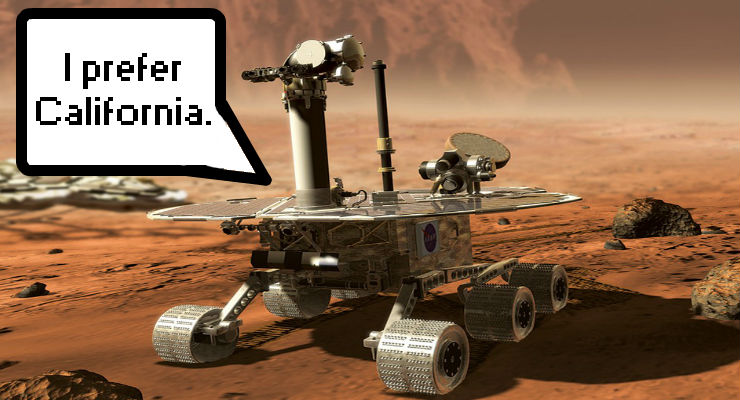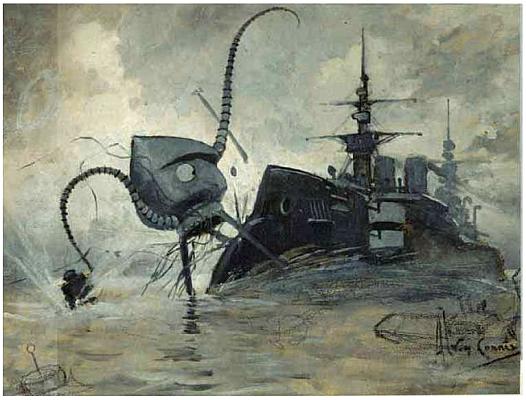
NASA’s Curiosity Rover is a testament to modern man’s obsession with Mars. More than any other planet in our solar system, the red giant has served and thrilled our imaginations in mythological as well as scientific realms. We were driven to suicide and formed mini-militias one Halloween night in 1938 when a very young Orson Welles delivered a radio broadcast of H. G. Wells’ War of the Worlds that, unfortunately, was far too realistic and convincing. We softened our hearts to perhaps better understand a forgotten and mysterious and marvelous and majestic society throughout the tragic anthropology of Ray Bradbury’s Martian Chronicles. And now, through photographs and soil samples sent back to earth by the most recent of the archaeologist-on-wheels Rover, we find that 3.5 billion years ago, there was a “drinkable” lake (according to scientist John Grotzinger) that presently contains many of the basic elements of life: carbon, hydrogen, oxygen, and nitrogen.

It seems, for both explicable and inexplicable reasons, that Mars holds a special place in our collective subconscious. Perhaps The War of the Worlds broadcast, almost 80 years ago, created a kind of “first cause” shock, just as the attacks on Pearl Harbor and 9/11 forever changed the emotional landscape of America. Starring Perry Mason’s Raymond Burr in McCarthy-era ‘50s paranoia and Mission Impossible’s Tom Cruise with ready-made, antiseptic Hollywood of the late-2000s, the two films adapted from the novel built upon the fear generated by the broadcast.
Perhaps we were reliving our fear of the unknown and being attacked on our own soil; perhaps we were identifying with powers of destruction, trying to assuage a deep-seated guilt after Nagasaki and Hiroshima. Mars, after all, has always been typecast, perhaps unfairly, as the planet of war, portrayed in Holst’s The Planets as an evil aggressor.
Grotzinger goes on to explain, as Science journal published the recent findings, that this body of water more than likely sustained prehistoric forms of life, in much the same way that early bodies of water did on earth, when microscopic biology was the only manifestation of life worthy of the name.
It is interesting to note how such hard science, producing only the tiniest sliver of the beginnings of life, contrasts so dramatically with the passionate visions of those who yearn to believe that Mars, somehow, was a distant relative, if not a father, to earth. While many believers in the famous “Face on Mars,” as well as the clusters of so-called pyramids, have been rebuffed by more objective photographic analysis over the years, we cannot deny the mystical ways in which many of us, including Bradbury in his compassionate novel, view Mars as an aboriginal entity, a beginning somehow linked to our lives, but, sadly, forever lost to our memory and our proof, like Atlantis or the ancient Mayans.
According to David Paige, there is no question that, at one time, Mars did sustain life. Based on the Rover findings, ancient Mars had a lush, tropical environment, but volcanic activity, beginning around 3.5 billions ago, turned this otherworldly Eden into the barren, ashen world we see today. It seems, going back more than 60 years to Bradbury’s world of the imagination, that we yearn for Mars to have been more than a silent rock quarry or a dead orb. As the protagonist discovers bit by bit in The Martian Chronicles, Mars was an ancient society, just like the Greeks or the Romans or the Egyptians. It had culture, law, politics, architecture, and, above all, beauty and morality.
Our Ancient Alter Ego?
It may be that the mystique created by the “face” and “pyramid” photographs is our embedded wish to be better; that, perhaps, if Mars had the same beginnings that history has revealed to us on Earth, and that, for a time, it may have been magnificent, that if somehow it lost its way and destroyed itself, hopefully we can take a different path.
Adrian Tawfik says
Welcome aboard the DC team Peter! This is a very interesting angle on sci fi turning into reality. Thanks for your interest in publishing together.